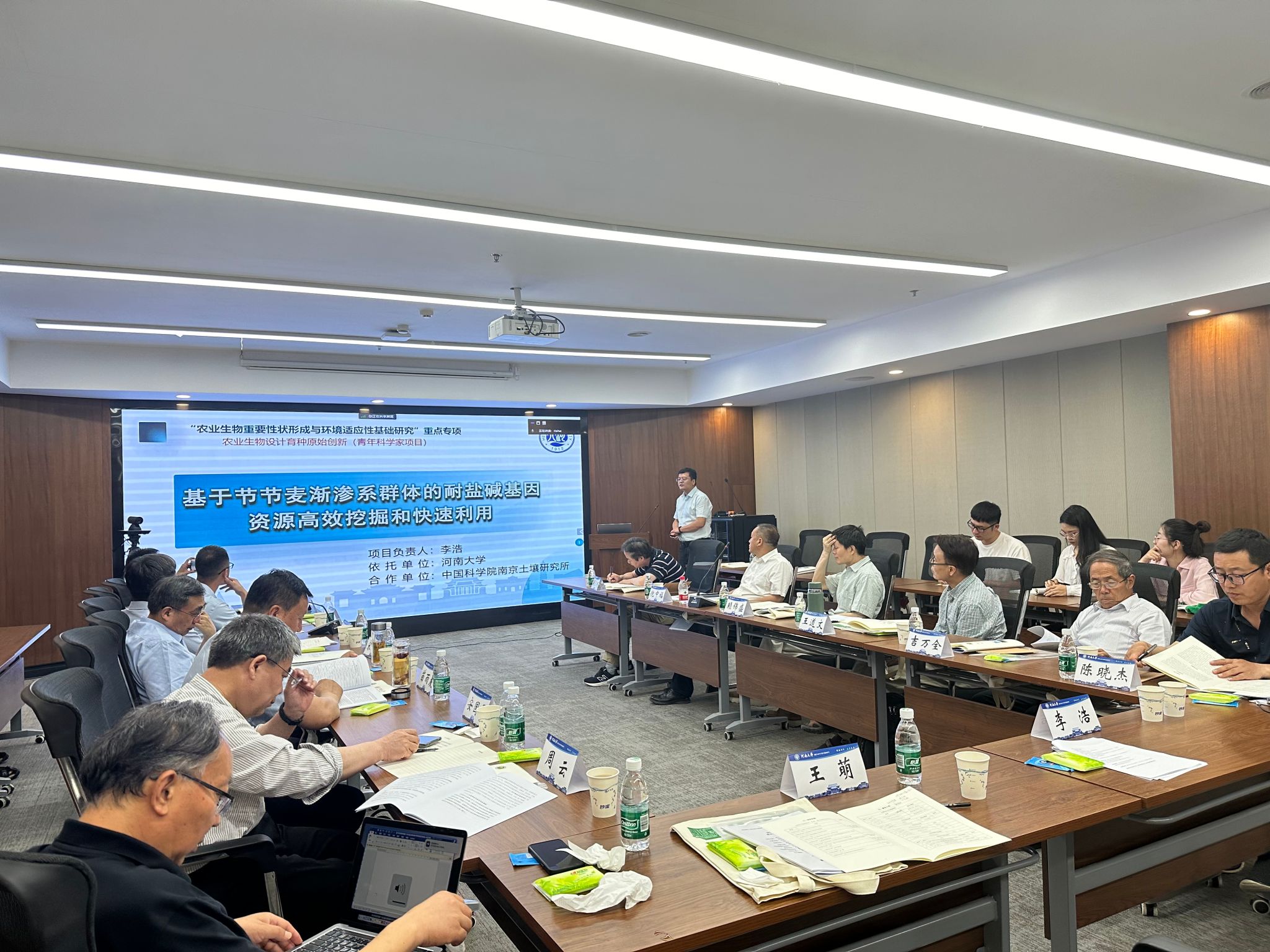


The launch meeting for the “14th Five-Year Plan” National Key Research and Development Program Young Scientist Project, undertaken by Professor Hao Li from Professor Chunpeng Song’s research team, was held at the Minglun Campus of Henan University (HENU) on May 30th. Attendees included Xiaoguang Zheng, Project Specialist from the China Rural Technology Development Center; Shaqiu Zhang, Tao Zhang, and Zhuanjian Li, Mobile Specialists; Jinhui Li, Director of the Division of Agricultural and Rural Science and Technology of the Department of Science and Technology of Henan Province; Yucheng Miao, Vice President of HENU; and Chunpeng Song, Director of the State Key Laboratory of Crop Stress Adaptation and Improvement. The meeting was chaired by Hao Deng, Deputy Director of the Institute of Science and Technology.
On behalf of HENU,Yuchen Miao extended his sincere gratitude to the experts and leaders for attending the project launch meeting., and then provided an overview of HENU, highlighting the development of its Double First-Class discipline in Biology. He expressed his hope that the expert group would offer valuable advice and suggestions for the project’s implementation. Representing the Department of Science and Technology of Henan Province, Jinhui Li congratulated HENU on securing the National Key Research and Development Program Young Scientist Project. He emphasized the project’s significance in safeguarding national food security and encouraged the project team to leverage national resources to address critical industry challenges.
Xiaoguang Zheng provided a comprehensive overview of the application and approval process for the “14th Five-Year Plan” National Key Research and Development Program over the past three years, emphasizing the requirements for newly launched projects. Shaqiu Zhang delivered a report on the integrated implementation and management of the special program. He outlined the key tasks of the center for 2024 and provided a detailed interpretation of the overall program, management requirements, and points for attention.
The expert panel for the project launch meeting comprised distinguished professionals including Professor Jinsheng Lai from China Agricultural University and Professor Wanquan Ji from Northwest A&F University. Professor Jinsheng Lai, a consulting expert for the National Key Research and Development Program, presided over the expert review session. Professor Hao Li, the project lead, presented a comprehensive report on the project’s implementation and management plan. The expert panel expressed strong affirmation for the proposed plan and offered valuable insights and suggestions from various perspectives. Xiaojie Chen, Associate Research Fellow from the Henan Academy of Sciences Isotope Research Institute, representing the project’s end-users, expressed anticipation for the project’s outcomes to be translated into practical applications and generate economic benefits. Following the meeting, the expert panel and representatives from collaborating institutions conducted a field visit to the Wheat Stress Resistance Improvement Center to inspect the platforms for new wheat germplasm development and stress resistance research.
During the meeting, Professor Chunpeng Song engaged in fruitful discussions with the experts and collaborating institutions, elaborating on the progress and future plans of his research team in the field of wheat studies. He expressed his gratitude for the support received from the expert panel and collaborators for this project. Professor Song emphasized his hope that the project’s implementation would effectively serve national strategies and offered suggestions and expectations for the project’s industrial application.
As a major agricultural province in China, Henan Province shoulders the critical responsibility of ensuring national food security. Professor Chunpeng Song’s wheat stress resistance improvement team at HENU has been tackling the bottlenecks in modern wheat breeding and improvement. Under Professor Song’s leadership and guidance, the team has implemented the “Wheat D Genome Reconstruction Project”. This project successfully transferred over 99% of the genetic diversity from Aegilops tauschii (the D genome donor) to common wheat. This achievement is expected to have a profound impact on the genetic improvement and utilization of elite genes in wheat and other cereal crops in the post-genomic era.
In recent years, the wheat stress resistance improvement team has secured a number of national and provincial-level projects as the lead research group, including key projects funded by the National Natural Science Foundation of China and the Henan Provincial Key Research and Development Program, focusing on fundamental and applied research in wheat stress resistance. The “14th Five-Year Plan” National Key Research and Development Program Young Scientist Project, headed by Professor Li Hao, represents a crucial component of the team’s ongoing “Wheat D Genome Reconstruction Project”. This project directly addresses the national strategic needs for the conservation, utilization, and development of salt-alkali tolerant wheat varieties. The project’s success underscores the innovative mechanisms and robust foundation of HENU’s first-class discipline in Biology, particularly in the realm of organized scientific research.

 News /
Content
News /
Content


